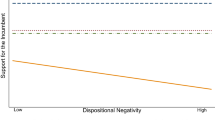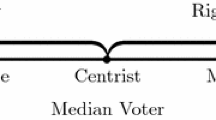Abstract
Theories from psychology suggest that voters’ perceptions of political positions depend on their non-policy related attitudes towards the candidates. A voter who likes (dislikes) a candidate will perceive the candidate’s position as closer to (further from) his own than it really is. This is called projection. If voters’ perceptions are not counterfactual and voting is based on perceived policy positions then projection gives generally liked candidates an incentive to be ambiguous. In this paper we extend the standard Downsian model in order to investigate under what conditions this incentive survives in the strategic setting of electoral competition.
Similar content being viewed by others
References
Alesina, A., & Cukierman, A. (1990). The politics of ambiguity. Quarterly Journal of Economics, 105(4), 829–850.
Ansolabehere, S. D., & Snyder, J. M. Jr. (2000). Valence politics and equilibrium in spatial election models. Public Choice, 103(3–4), 327–336.
Aragonès, E., & Neeman, Z. (2000). Strategic ambiguity in electoral competition. Journal of Theoretical Politics, 12(2), 183–204.
Aragonès, E., & Palfrey, T. R. (2002). Mixed equilibrium in a Downsian model with a favored candidate. Journal of Economic Theory, 103(1), 131–161.
Aragonès, E., & Palfrey, T. R. (2005). Electoral competition between two candidates of different quality: The effects of candidate ideology and private information. In D. Austen-Smith & J. Duggan (Eds.), Social choice and strategic decisions: Essays in honor of Jeffrey S. Banks (pp. 93–112). Berlin: Springer.
Callander, S., & Wilson, C. H. (2008). Context-dependent voting and political ambiguity. Journal of Public Economics, 92(3–4), 565–581.
Glazer, A. (1990). The strategy of candidate ambiguity. American Political Science Review, 84(1), 237–241.
Granberg, D. (1993). Political perception. In S. Iyengar & W. J. McGuire (Eds.), Explorations in political psychology (pp. 70–112). Durham: Duke University Press.
Groseclose, T. J. (2001). A model of candidate location when one candidate has a valence advantage. American Journal of Political Science, 45(4), 862–886.
Krosnick, J. A. (2002). The challenges of political psychology: Lessons to be learned from research on attitude perception. In J. Kuklinski (Ed.), Thinking about political psychology (pp. 115–152). Cambridge: Cambridge University Press.
Meirowitz, A. (2005). Informational party primaries and strategic ambiguity. Journal of Theoretical Politics, 17(1), 107–136.
Merrill, S. III, Grofman, B., & Adams, J. (2001). Assimilation and contrast effects in voter projections of party locations: Evidence from Norway, France and the USA. European Journal of Political Research, 40(2), 199–221.
Page, B. (1976). The theory of political ambiguity. American Political Science Review, 70(3), 742–752.
Shepsle, K. (1972). The strategy of ambiguity: Uncertainty and electoral competition. American Political Science Review, 66(2), 555–568.
Tomz, M., & Van Houweling, R. P. (2009). The electoral implications of candidate ambiguity. American Political Science Review, 103(1), 83–98.
Author information
Authors and Affiliations
Corresponding author
Rights and permissions
About this article
Cite this article
Jensen, T. Projection effects and strategic ambiguity in electoral competition. Public Choice 141, 213–232 (2009). https://doi.org/10.1007/s11127-009-9449-4
Received:
Accepted:
Published:
Issue Date:
DOI: https://doi.org/10.1007/s11127-009-9449-4




